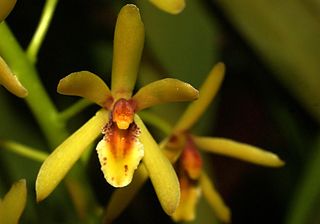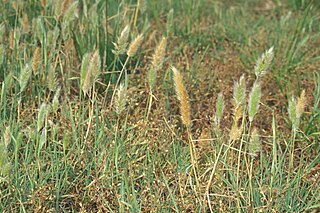
Cymbidium suave, commonly known as the snake orchid or grassy boat-lip orchid, is a plant in the orchid family and is endemic to eastern Australia. It is an epiphytic orchid that forms long-lasting clumps of grass-like leaves. Up to fifty crowded olive green to dark or brownish green flowers are borne on an arching flowering stem. Of the three Australian species of Cymbidium, this is the only one that does not have prominent pseudobulbs. It is found in eastern Australia, usually growing in the hollows of old or fallen, decaying trees.
Prodromus Florae Novae Hollandiae et Insulae Van Diemen is book dealing with the flora of Australia written by botanist Robert Brown and published in 1810. Often referred to as Prodromus Flora Novae Hollandiae, or by its standard botanical abbreviation Prodr. Fl. Nov. Holland., it was the first attempt at a survey of the Australian flora. It described over 2040 species, over half of which were published for the first time.

Cynosurus is a genus of Eurasian and North African plants in the grass family. Plants in this genus are known generally as dogstail grass. They are native to the Mediterranean Basin and neighboring regions, but some have been introduced into Australia as well as North and South America.

Polypogon is a nearly cosmopolitan genus of plants in the grass family, commonly known beard grass or rabbitsfoot grass.

Spinifex longifolius, commonly known as beach spinifex, is a perennial grass that grows in sandy regions along the seacoast. It also lives in most deserts around Australia.

Anisopogon is a genus of Australian plants in the grass family. The only known species is Anisopogon avenaceus, native to Victoria and New South Wales. It is known commonly as oat speargrass. It is a perennial grass growing up to 1.5 metres tall, bearing spikelets up to 6 centimetres long.

Dianella revoluta, commonly known as blueberry lily, blue flax-lily, or black-anther flax-lily, a species of flowering plant in the family Asphodelaceae and is endemic to, and widespread in Australia. It is a tufted, perennial herb with grass-like leaves and up to nine blue or violet flowers with six tepals, and stamens with bright yellow filaments and pale brown to almost black anthers.

Schoenus brevifolius, known as zig-zag bog-rush, is a species of sedge native to Australia, New Zealand, New Caledonia, and the Ogasawara (Bonin) Islands. It was first described by Robert Brown in 1810.

Johnsonia is a genus composed of five species of herbs in the family Asphodelaceae, all of which are endemic to the south-west of Western Australia. They are grass-like plants with minute flowers surrounded by bracts which are often tinged with white, pink or cream.

Chaetanthus is a group of plants in the Restionaceae described as a genus in 1810. The entire genus is endemic to the southern part of Western Australia.

Schizaea rupestris is a small Australian fern. Most populations are in found in the ranges near Sydney. However, it also occurs near Woolgoolga and Western Australia.

Triodia pungens, commonly known as soft spinifex, is a species of grass native to northwestern Australia. The plant is currently being researched due to its resinous properties as a Termite timber coating. Other research and applications are as a latex enhancer and bitumen adhesive.

Cuscuta australis, commonly known as Australian dodder, is a herb in the family Convolvulaceae.

Cyperus tenellus is a sedge of the family Cyperaceae commonly known as the tiny flatsedge.

Samolus junceus in the family Primulaceae is a species of water pimpernel native to Western Australia.
Polypogon maritimus, the Mediterranean rabbitsfoot grass, is a species of annual herb in the family Poaceae. They have a self-supporting growth form. Individuals can grow to 0.17 m.

Polypogon viridis, the beardless rabbitsfoot grass, is a species of perennial grass in the family Poaceae. They have a self-supporting growth form and simple, broad leaves. Individuals can grow to 0.43 m. They are native to southern Europe, Macaronesia, North and East Africa, and Asia.
Leucocoprinus tenellus is a species of mushroom producing fungus in the family Agaricaceae.
Perotis rara is a species of grass in the family, Poaceae, first described by Robert Brown in 1810. It is native to Australia, South-east China, Malaya, New Guinea, the Philippines, Taiwan, Thailand, and Vietnam.

Schoenus pedicellatus is a species in family Cyperaceae, first described by Robert Brown in 1810 as Chaetospora pedicellata, but assigned to the genus, Schoenus, in 1811 by Jean Louis Marie Poiret. Note that GBIF and Plants of the World Online both give the genus change as being by Roem. & Schult. However the species is Australian and the text by Poiret is earlier than that of Roemer and Schultes.
















